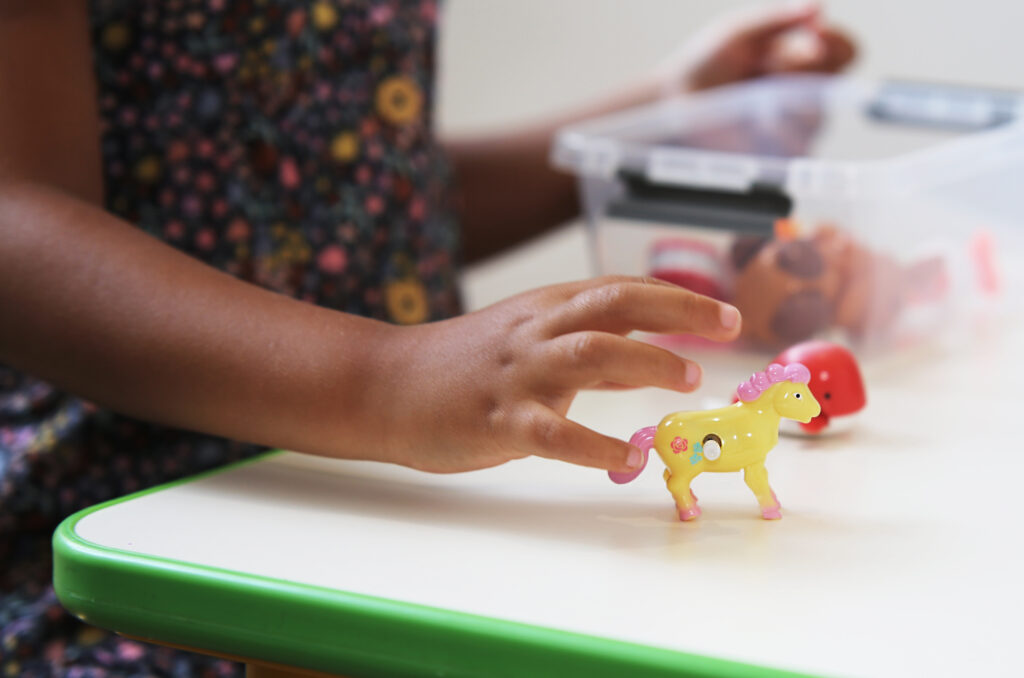Play Therapy for Your Child
 More and more families with young children seek out play therapy as a transformative approach to promote mental health and emotional resilience in their children. This unique therapeutic method can help foster healthy emotional development in young minds. Being a parent is a difficult job and the loneliness of not being able to help your child can drain energy from every area of your life. Have you heard the phrase, “you are only as happy as your unhappiest child?” Whether that is true or not, every parent can identify with the sleepless nights and endless conversations over how to help their children. Young children often need a different approach to therapy than adults.
More and more families with young children seek out play therapy as a transformative approach to promote mental health and emotional resilience in their children. This unique therapeutic method can help foster healthy emotional development in young minds. Being a parent is a difficult job and the loneliness of not being able to help your child can drain energy from every area of your life. Have you heard the phrase, “you are only as happy as your unhappiest child?” Whether that is true or not, every parent can identify with the sleepless nights and endless conversations over how to help their children. Young children often need a different approach to therapy than adults.
What is Play Therapy
Play therapy is a powerful psychological approach specifically developed for children aged 3 to 12 years. It utilizes the natural medium of play to help children express their feelings, thoughts, and experiences in a safe and supportive environment. This unique therapy for children is grounded in the belief that play is essential to a child’s developmental process. It’s how they explore the world, express themselves, solve problems, and learn about relationships.

Dawn Lamprecht is a Licensed Therapist at East Cobb Relationship Center and is trained as a Registered Play Therapist. Dawn uses play therapy to engage children in a way that verbal communication alone might not. Dawn uses the theoretical models of Adlerian Play therapy, Child-Centered Play Therapy, and Cognitive Behavioral Play Therapy to help your child overcome their challenges.
Using toys, art, sand tray, games, puppets, music, or other media, Registered Play Therapists can help children work through emotional or psychological challenges.
The Association for Play Therapy defines play therapy as “the systematic use of a theoretical model to establish an interpersonal process wherein trained play therapists use the therapeutic powers of play to help clients prevent or resolve psychosocial difficulties and achieve optimal growth and development.”
What Issues does Play Therapy address?
Play therapy caters to a wide range of psychological and emotional issues due to its versatility. Parents seek out play therapy for several reasons:

- Behavioral Problems: Issues such as aggression, school refusal, excessive shyness, or difficulties with attention and concentration can be ameliorated through play therapy.
- Emotional Disorders: Therapeutic play sessions can address anxiety, depression, and other emotional disturbances effectively.
- Trauma and Abuse: Children who have experienced traumatic events can find a voice through play, helping them process complex feelings in a supportive environment.
- Family Dynamics: For children navigating through parental divorce, sibling rivalry, or the integration of step-families, play therapy offers a platform to express feelings and find stability.
- Developmental and Learning Disabilities: Children with autism spectrum disorders, ADHD, sensory integration issues, and other developmental challenges can achieve substantial progress in their social and emotional skills through guided play therapies.
How Children Benefit from Play Therapy
We know that you place high priority on family wellness and the well-being of your children. And, we recognize that when a child suffers from mental strains of anxiety, grief, peer relationships, and academic difficulties, the stress leaks through to the whole family. At East Cobb Relationship Center, we believe in helping your child without letting them become the scapegoat for all the family’s problems. If your pre-school through elementary-aged child is struggling, then they may benefit from play therapy.
The multifaceted benefits of play therapy can help with:
- Emotional Resilience: Play therapy allows children to experience and express emotion in a controlled environment, helping them develop coping mechanisms for dealing with feelings such as anger, sadness, or frustration.
- Enhanced Communication Skills: Play therapy sessions encourage children to express their thoughts and feelings. This can be particularly beneficial for those who have limited verbal communication skills.
- Behavioral Improvement: For children showing signs of behavioral issues, play therapy offers a way to explore alternative behaviors within a safe setting.
- Social Skills Development: Interactive play in a therapeutic setting enhances a child’s ability to cooperate, share, and interact with others which is crucial for school readiness.
- Trauma Recovery: Play therapy allows children to express their pain when they can’t find the words to describe their feelings. Therefore, it helps children process and recover from traumatic events.
Reach Out Today
Registered Play Therapists are equipped with the tools and expertise necessary to guide your child toward a healthier, more balanced psychological state.
When you seek out play therapy for your child, it’s important to consult with a therapist who can tailor sessions to your child’s specific needs. This ensures that each child receives the personalized care they deserve. Families interested in exploring play therapy should look for practitioners with credentials from the Association for Play Therapy. Parents can also learn more through the Georgia Association for Play Therapy.
Play therapy continues to gain traction as an effective means of addressing and resolving childhood challenges. If you believe your child could benefit from play therapy, please contact us today. Our therapists can offer guidance tailored to your family’s needs. Foster wellness in your child’s life through the power of play, watch them thrive in every aspect of their development, and bring peace back to your family.
